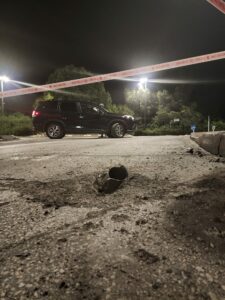[vc_row][vc_column][vc_column_text]In preparation for the reconstruction of the statue of late president Hafez Al-Assad – Dara’a protests rise again
Almost exactly 8 years since the beginning of the uprisings in Syria (15.3.2011), the city of Dara’a (33 km/20.5 miles from the Israeli border), where the uprisings began, is protesting once more. The Syrian government re-gained control over the city last July and since then graffiti stating “down to Assad” were seen occasionally. The graffiti is one of the symbols of the uprisings as the arrest of a group of youth from Dara’a in 2011 was the sparking moment of the uprisings.
This time, the locals were protesting the reconstruction of the statue of the late president Hafez Al-Assad, the current president’s father. The destruction of the statue in March 2011 symbolized the rise of the Syrian opposition against the government, and its reconstruction symbolizes Assad’s victory in the 8-year war. Moreover, one of the most noted claims of the locals was the fact that the government passed law no. 10 for the reconstruction of Syria, and it is using it to reconstruct the Assad statue instead of the reconstruction of the city for the benefit of the people.[/vc_column_text][/vc_column][/vc_row][vc_row][vc_column][vc_single_image image=”3483″ img_size=”full” add_caption=”yes”][/vc_column][/vc_row][vc_row][vc_column][vc_column_text]The actions of the Syrian government show that even though the government has regained control of former opposition territories, the control it has remains fragile. The causes of the Syrian uprisings that escalated to war are yet to be addressed and may have even intensified, particularly due to the frustration over the high price that the Syrian people had to pay in this war.[/vc_column_text][/vc_column][/vc_row][vc_row][vc_column][vc_single_image image=”3487″ img_size=”full” add_caption=”yes”][/vc_column][/vc_row][vc_row][vc_column][vc_single_image][/vc_column][/vc_row][vc_row][vc_column][vc_column_text]Photos from http://www.horanfree.com[/vc_column_text][/vc_column][/vc_row]






